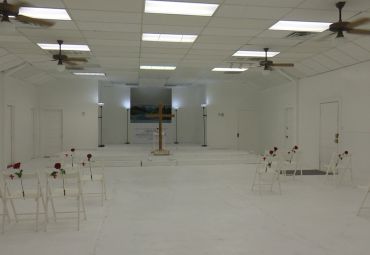Have we over-corrected?
Roughly ten years ago, I first viewed Penn Jillette’s “Gift of a Bible” video on YouTube. It was a sincere confession from an avowed atheist that he actually regarded confrontational evangelism as sane and compassionate. Interestingly, his analogy was one of impending judgment:

“If I believed, beyond a shadow of a doubt, that a truck was coming at you and you didn't believe it; and that truck was bearing down on you, there's a certain point where I tackle you and this is more important than that.” (Penn Jillette)
 Peter Hitchens gives us an even better testimonial of the effectiveness of warning about judgment. As one of the so-called “four horsemen of New Atheism,” Hitchens’ brother Christopher promoted unbelief in speaking tours and dozens of books, including his 2007 publication, “God Is Not Great: How Religion Poisons Everything.” Peter and his brother took opposite sides in the question of God’s existence, debating the issue more than once in public. Peter himself was originally an atheist, but, in his book “The Rage Against God: How Atheism Led me To Faith,” Hitchens recounts this striking story of how a depiction of the judgment of God set him on the road to faith:
Peter Hitchens gives us an even better testimonial of the effectiveness of warning about judgment. As one of the so-called “four horsemen of New Atheism,” Hitchens’ brother Christopher promoted unbelief in speaking tours and dozens of books, including his 2007 publication, “God Is Not Great: How Religion Poisons Everything.” Peter and his brother took opposite sides in the question of God’s existence, debating the issue more than once in public. Peter himself was originally an atheist, but, in his book “The Rage Against God: How Atheism Led me To Faith,” Hitchens recounts this striking story of how a depiction of the judgment of God set him on the road to faith:
“What I can recall, very sharply indeed, is a visit to the Hotel-Dieu in Beaune, a town my girlfriend and I had gone to mainly in search of the fine food and wines of Burgundy. But we were educated travelers and strayed, guidebook in hand, into the ancient hospital. And there, worth the journey, according to the Green Michelin guide, was Rogier van der Weyden’s fifteenth-century polyptych The Last Judgment.
I scoffed. Another religious painting! Couldn’t these people think of anything else to depict? Still scoffing, I peered at the naked figures fleeing toward the pit of hell, out of my usual faintly morbid interest in the alleged terrors of damnation. But this time I gaped, my mouth actually hanging open. These people did not appear remote from the ancient past; they were my own generation. Because they were naked, they were not imprisoned in their own age by time-bound fashions. On the contrary, their hair, and, in an odd way, the set of their faces were entirely in the style of my own time. They were me and the people I knew. One of them—and I have always wondered how the painter thought of it—is actually vomiting with shock and fear at the sound of the Last Trump.
I did not have a “religious experience.” Nothing mystical or inexplicable took place—no trance, no swoon, no vision, no voices, no blaze of light. But I had a sudden, strong sense of religion being a thing of the present day, not imprisoned under thick layers of time. A long catalogue of my misdeeds, ranging from the embarrassing to the appalling, replayed themselves rapidly in my head. I had absolutely no doubt that I was among the damned, if there were any damned.”[1]
The field of Apologetics is often seen as a culture-, or peer-facing, ministry. Its aim is to “…honor Christ the Lord as holy, always being prepared to make a defense to anyone who asks you for a reason for the hope that is in you; yet do it with gentleness and respect,having a good conscience, so that, when you are slandered, those who revile your good behavior in Christ may be put to shame.” (1 Peter 3:15-16) A very careful examination of the passage hints at a priority of order. Our emphasis is upon the phrase “being prepared to make a defense,” which, in English, is a passive idea: it waits for a question. In the Greek it’s an even more passive part of the sentence. The only verb in the phrase that is part of the command is “honor.” In the Apostolic Bible Polyglot, it’s rendered, “…[As] Lord however Christ sanctify in the hearts of you, ready always for a defense to everyone asking you an account concerning the in you hope; yet with gentleness and fear, a conscience having good so that in this they might speak against you, they shall be ashamed those reviling your good in Christ manner of life.”
C. S. Lewis’ words on Christian Apologetics in “God in the Dock” ring very true: “I have found that nothing is more dangerous to one’s own faith than the work of an apologist.”[2] Constantly crafting arguments in defense of attacks on Christianity can, as he puts it, make it seem no stronger than the web of our own arguments unless we continually fall back from them upon Christ Himself. It seems likely that this is one reason the Apostle was moved by the Holy Spirit to write the sentence in such a way. Sanctify Christ first and foremost, then answer, but do so with gentleness and fear.
Such sanctification and fear will prioritize faithfulness to God’s self-revelation regarding His nature. It will be gentle in so doing, as Jesus Himself was the fulfillment of Isaiah’s prophecy, careful not to break the bruised reed or extinguish the faintly burning wick. (Isaiah 42:3; Matthew 12:20) Yet Jesus was neither timid to confront His opposition nor reluctant to fully disclose God’s judgment. The very passages speaking of Jesus’ gentleness and meekness are followed, without any trace of editorial concern on Matthew’s part, by His discussion of the unpardonable sin, future condemnation and judgment of His generation by some of the gentile oppressors of Jonah’s day.













